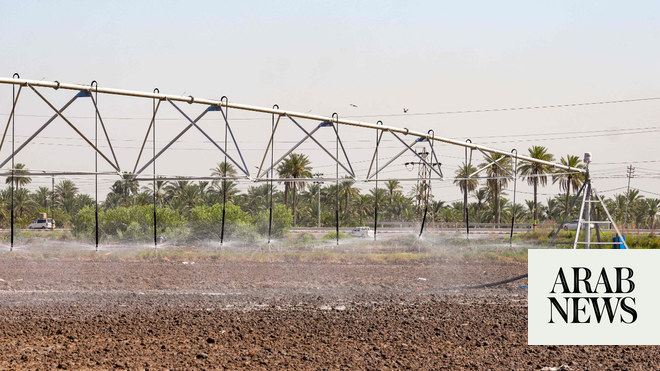NAJAF, Iraq: After seeing his once lush rice field shrink in recent years due to relentless drought, Iraqi farmer Muntazer Al-Joufi fought back by using tougher seeds and water-saving irrigation techniques.
“This is the first time we are using modern techniques that use less water” to grow rice, Joufi, 40, said as he surveyed his land in the central Najaf province.
“There's a huge difference” from flooding the field, Joufi added, referring to a traditional method in which the soil must remain submerged all summer.
But four consecutive years of drought and declining rainfall have strangled rice production in Iraq, which is still recovering from years of war and chaos and where rice and bread are a staple of the diet.
The United Nations states that Iraq is one of the five most vulnerable countries in the world.
Joufi is among the farmers receiving support from the agriculture ministry, whose experts have developed innovative methods to save Iraq's rice production.
Their work involves pairing hardy rice seeds with modern irrigation systems to replace flooding in a country plagued by water shortages, heat waves and shrinking rivers.
Under Iraq's scorching sun, with the temperature soaring to 50 degrees Celsius (122 Fahrenheit), Joufi trudged across the muddy field, stopping to tend to malfunctioning sprinklers spread over a hectare (2.5 acres) of land.
Iraq's rice crop typically requires between 10 and 12 billion cubic meters of water during the five-month growing period.
However, experts say the new methods using sprinklers and drip irrigation use 70 percent less water than the traditional practice of flooding, when workers had to make sure fields were completely covered with water.
Now, Joufi said, it only takes “one person to turn on the sprinklers … and the water reaches every patch of land.”
Agriculture ministry experts say that during the drought years, the area planted with rice has shrunk from more than 30,000 hectares to just 5,000.
“Because of the drought and water shortage, we have to use modern irrigation techniques and new seeds,” said Abdel Kazem Jawad Moussa, who leads a team of such experts.
They experimented with different types of sprinklers, drip irrigation, and five different types of drought-resistant, water-saving seeds, hoping to find the best combination.
“We want to find out which seed genotypes respond well” to irrigation using sprinklers instead of flooding, Moussa said.
Last year, Al-Ghari – a genotype derived from Iraq's prized amber rice – and South Asian jasmine seeds performed well when grown with small sprinklers, so experts offered the combination to farmers like Joufi, hoping to be better.
“At the end of the season, we will come up with recommendations,” Moussa said, adding that he also hopes to introduce three new types of seeds next year with a shorter planting season.
In addition to the drought, authorities blame upstream dams built by Iraq's powerful neighbors Iran and Turkiye for the dramatic drop in water levels in the Tigris and Euphrates rivers, which have irrigated Iraq for millennia.
Water shortages have forced many farmers to abandon their plots, and authorities have drastically reduced farm activity to ensure enough drinking water for Iraq's 43 million people.
In 2022, authorities limited rice cultivation areas to 1,000 hectares in Najaf and the southern province of Diwaniyah, the heartland of amber rice planting.
Recently, farmers in Diwaniyah protested, demanding that the government allow them to cultivate their land after a two-year shutdown.
But despite heavy rains this winter, which have helped alleviate water shortages, authorities have only allowed them to grow rice on 30 percent of their land.
“The last good year was 2020,” said farmer Fayez Al-Yassiri in his field in Diwaniyah, where he hopes to expand on growing amber and jasmine rice.
Iraq is the second largest oil producer in the OPEC cartel, but despite having huge oil and gas reserves, it remains dependent on imports to meet its energy needs and faces chronic power outages.
Yassiri called on the authorities to help, especially by providing electricity and pesticides to farmers.
His cousin Bassem Yassiri was less hopeful. “The lack of water has put an end to agriculture in this region,” he said.
